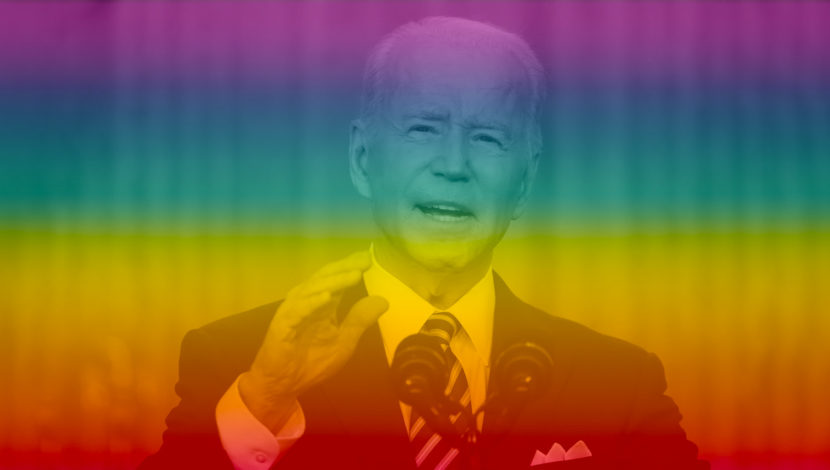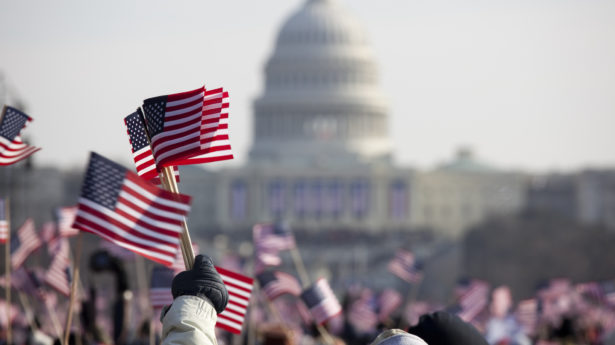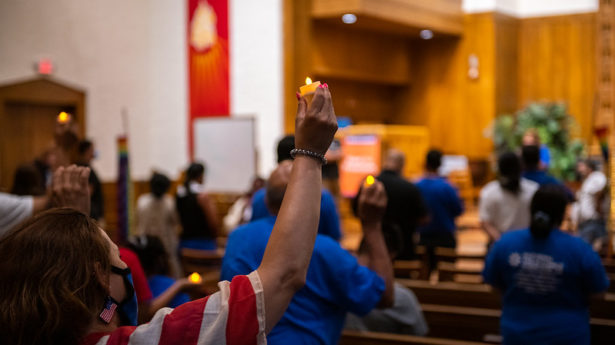The Unitarian Universalist Service Committee advances human rights through grassroots collaborations.
LGBTQIA+ Immigrants Continue to Struggle Under the Biden Administration

June 27, 2022
Uchechukwu Onwa is the co-director of UUSC partner Queer Detainee Empowerment Project. In honor of Pride month, he penned a poignant reflection on the intersection of sexual/gender identities and immigration.
###
Moving to New York City from Chicago in March 2019 was one of the toughest and most difficult decisions I have ever had to make. I moved without any resources, a difficult decision for someone who had just escaped a traumatic experience in immigration detention where I spent three traumatic and horrible months. I was homeless my first two weeks in New York and was forced to move to a city shelter, which was re-traumatizing for me as some experiences reminded me of my detention experiences.
Queer and trans immigrants seeking asylum experience unimaginable violence in their countries and on the dangerous journey to the United States. They come to the United States to find safety, protection, and freedom, but instead are being met with more violence and cruelty, punished for asserting their right to seek asylum, and while communities and grassroots organizations are fighting changes in immigration law and local policies, those efforts are based on a narrative centered on families, defined through a heteronormative lens.
A “family,” according to the immigrant movement, consists of a cisgender mother, a cisgender father, and their biological children. The narrow focus of that narrative means that LGBTQIA+ immigrants lack a platform to advocate for resources specific to their needs because most of us don’t have our biological families here.
Healthcare Injustice is Deadly
LGBTQIA+ immigrants in detention are often denied access to critical medical care such as HIV testing and treatment, as well as hormone therapy. In recent years, three HIV+ trans women died in detention due to medical neglect, those deaths were followed by multiple accounts from QDEP’s members regarding denial by Immigration and Customs Enforcement (ICE) of medical treatment for HIV or hormone therapy. Many of our members were released from ICE detention with terrible health conditions due to ICE’s medical neglect.
I am still pained and heartbroken over the death of QDEP member Faby Federick, who’s death was a result of the trauma she experienced in immigration detention that added to the mental health impacts she faced in her home country as a Black trans woman. Faby was an amazing, inspiring, motivating human being with a smile that will light up a room. I remember the first time I met Faby in person during one of our member meetings; she was so excited to be with a community that affirms her and appreciates her for existing after one year in ICE custody, I got to know more about Faby’s experience in immigration detention when I got to speak with her more often.
Oliver’s Story: Deported to Danger
Every year, the United States spends more than $2 billion in taxpayer money on detaining immigrants in greater than 200 detention facilities. That money should be invested in our communities, more jobs, and affordable housing for Black and Brown communities, especially immigrant communities. U.S. politicians should take full responsibility for the death of all trans women, kids, and parents and do the right thing: Shutting down all the detention centers and freeing everyone.
Oliver J. Dunbar was a member of QDEP and a Black gay migrant from Jamaica who was detained for more than two years. After living in the United States for more than 40 years, Oliver was arrested at his family home in New Jersey, detained, and eventually transferred more than a thousand miles away from his family and loved ones to the Krome Detention Center in Miami.
In detention, Oliver was harassed and assaulted, and when he requested essential care for medical issues stemming from this abuse, ICE denied him treatment. ICE—and the Biden administration—could have released Oliver at any time to return to New Jersey and be with his family, but instead, they deported him back to a homophobic country he hadn’t visited in more than four decades. He deserves to stay in the country he calls home.
Paul’s Story: A Dream Deferred
Paul White is a Black bisexual migrant who has lived in the United States for more than 21 years. He is an entrepreneur with a passion for cooking; his dream is to open a food truck, serving meals and snacks from his home country. Paul has some health issues, including type 2 diabetes and hypertension. He also struggles with depression and anxiety. Paul has a young daughter, who is a U.S. citizen and misses him, as well as friends and family; his entire community is in the United States. Since, August 2020, he’s been detained by ICE at the Caroline Detention Center in Virginia and is facing imminent deportation to a very homophobic country that he hasn’t visited in decades.
Jorge’s Story
Jorge Rondon-Torrealba is originally from Venezuela, but has been living in the United States since he was three years old; he calls New York City his home. He is a former Deferred Action for Childhood Arrivals (DACA) recipient and proud member of the queer community. Despite his bright future, ICE took away his DACA status and he is currently detained at an ICE facility—Krome North Service Processing Center in Miami, where he continues to fight for his release. Jorge has a right to seek asylum in the United States due to his queer identity and fear of persecution in Venezuela, yet ICE blatantly disregards his vulnerability and right to fight his case by refusing to release him while his immigration case is pending.
ICE shackled him for over 13 hours and transferred him from a Pennsylvania detention center to a detention center in Louisiana, and then to the Krome facility in Miami. Since the United States has banned flights into Venezuela, Jorge faces the possibility of indefinite detention.
And with all the struggles that LGBTQIA+ immigrants have to deal with, including the trauma of incarceration by ICE, applying for asylum based on sexual orientation is the only way for some of them to legalize their status. Currently, those who apply for asylum based on sexual orientation must do so within a year of entering the country. This disproportionately disadvantages queer and trans immigrants, many of whom are unaware of the asylum provision or are recovering from torture and persecution.
“…the law is good for some people, but not people who look like me.”
As a Black gay man from Nigeria who experienced dehumanizing conditions in ICE detention including life-threatening events as a result of being denied medical treatment, mental and emotional anguish leading to suicide attempts, and no subsequent access to mental care, I cannot overstate the importance I place on my role in advocating for Black and all LGBTQIA+ immigrants’ lives.
As someone with this lived experience, I strive to give my community a voice so they can lead and specifically address the issues impacting their lives and wellbeing. I still live with the trauma of being detained at an airport upon my arrival and having my legs shackled to my waist and hands. Even when I was sick in detention to the point of almost losing my life, I was again chained and taken to a hospital where I was chained to the hospital bed and given a bowl to urinate in.
I may have a job and an apartment, I may dress well and have some money to live, but in silence, I suffer a lot mentally as a result of this system. Most times I get into an airplane traveling I start shedding tears because I know the airplane can go everywhere in the United States but can’t go anywhere else outside the country.
The Biden administration has continued Trump’s legacy of racist attacks against Black immigrants using Title 42; we all saw it happen last year when 14,000 Haitian migrants were tortured at the border and expelled while 76,000 Afghanis were welcomed into this country and more than 100,000 Ukrainians will be admitted. So the law is good for some people, but not people who look like me.
As you celebrate Pride this year, remember that there are LGBTQIA+ immigrants in detention that should be here with us to celebrate Pride too, but ICE chooses to cage them. Remember organizations like the QDEP and do not forget to support this organization this Pride month and every other month. Remember those in hostile and homophobic countries and support international grassroots organizations.
We should keep the fight and never rest until LGBTQIA+ immigrants and asylum-seekers are protected.
We should continue to hold this administration accountable until they fulfill their promise of protecting queer and trans immigrants and asylum-seekers because it has been more than a year since Biden publicly made a promise that he would protect LGBTQIA+ refugees and asylum-seekers, but he has done nothing to fulfill that promise.
I call the on the U.S. government to listen to everybody and make reforms that do not increase funding, staffing, or legitimacy to incarceration or detention, but work towards freeing everyone.
Uchechukwu Onwa (he/him/his) is a Nigerian-born organizer, trainer, abolitionist and movement strategist, who fled his home country due to the repression and persecution he faced as a gay man. He is the co-director of the Queer Detainee Empowerment Project (QDEP), a New York-based nonprofit that provides structural, health/wellness, educational, legal, and emotional support and services for LGBTQIA+ immigrants in and outside immigration detention.
###
Photo Credit: Getty Images—Chip Somodevilla

